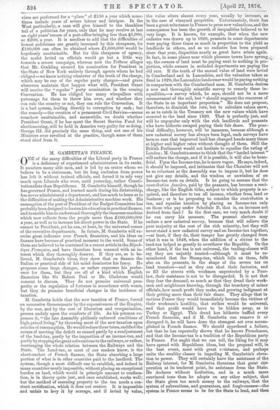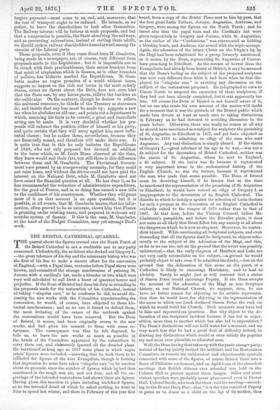M. GAMBETTA'S FINANCE.
.ONE of the many difficulties of the Liberal party in France is a deficiency of experienced administrators in its ranks. It numbers many able men, and is led by an orator whom we believe to be a statesman, but its long exclusion from power has left it without trained officials, and forced it to rely very much upon Liberals who were, until yesterday, rather Consti- tutionalists than Republicans. M. Gambetta himself, though he has governed France, and learned much during his dictatorship, has never administerefl a department, and has much to learn as to :the difficulties of making the Administrative machine work. His - assumption of the post of President of the Budget Committee has probably been designed to hasten his education in practical finance, and to enable him to understand thoroughly the immense machine which now collects from the people more than £100,000,000 a year, as well as to increase his direct power in the State. If he cannot be President, yet he can, at least, be the universal censor of the executive departments. In future, M. Gambetta will ex- ercise great influence over French financiers, and his ideas on finance have become of practical moment to the world. Some of -them are believed to be contained in a recent articlein the Re'pub- lique Franvise, and have therefore been scanned with an in- terest which they thoroughly deserve. If they are, as is be- lieved, M. Gambetta's ideas, they show that on finance the Italian or practical side of his mind dominates his fancy. He proposes some large changes, or rather expresses his prefer- ence for them, but they are all of a kind which English _financiers like Sir Robert Peel or Mr. Gladstone would consent to discuss. They do not promise universal pros- perity or the regulation of fortunes in accordance with wants, but they do promise beneficial changes in the incidence of taxation.
M. Gambetta holds that the new taxation of France, forced on successive Governments by the expensiveness of the Empire, by the war, and by the cost of liberation and reorganisation, presses unduly upon the comforts of life. As his penman ex- presses it, "the late Assembly pitilessly enforced conditions of high-priced living," by throwing most of the new taxation upon articles of consumption. He would reduce these taxes, and find the means of meeting the deficit so caused partly by a readjustment of the land-tax, partly by the imposition of an income-tax, and partly by stopping the great subventions to the railways, or rather, rearranging the whole relation between the Railways and the State. The Land-tax, as most of our readers know, is the sheet-anchor of French finance, the State absorbing a large portion of what is in other countries paid to the landlord. The system, though a most difficult one to establish, and indeed in many countries nearly impossible, without placing an exceptional burden on land, which would in principle amount to confisca- tion, is in theory quite just, and once established, works well ; but the method of assessing property to the tax needs a con- stant rectification, which it does not receive. It is impossible and unfair to levy it by acreage, and if levied by value, the value alters almost every year, usually by increase, as in the case of vineyard properties. Unfortunately, there has been a great reluctance in France to press new valuations, and the consequence has been the growth of inequalities believed to be very large. It is known, for example, that when the new cadastre was drawn up in 1820, peasants in some departments were paying three times as much in proportion to the yield as landlords in others, and as no cadastre has been prepared since that year, disparities nearly as great have arisen again. In fact, in some places near which pleasure towns have sprung 4, up, the owners of land must be paying next to nothing in pro- portion, while owners in secluded departments are paying the old rate. If the tenth of the annual value of land were levied in Cumberland and in Lancashire, and the valuation taken as fixed in 1820, the Lancashire landowner would be paying nothing in comparison with the Cumberland man. M. Gambetta desires a new and thoroughly scientific survey to remedy these in- equalities,—a survey which, he says, should not be a mere measurement of the soil, but " should augment the resources of the State in an important proportion." He does not propose, therefore, to diminish the rate, but to calculate values anew, so as to catch in the Treasury net the new values which have accreted to the land since 1820. That is perfectly just, and will be unpopular only with the rich landlords and peasants who have hitherto escaped paying their fair share. The prac- tical difficulty, however, will be immense, because although a new cadastral survey has always been legal, such surveys have been so rare that improved land has changed hands many times- at higher and higher rates without thought of them. Still the British Parliament would not hesitate to equalise the rating of London ; M. Gambetta seems to think that the "landed interest" will endure the change, and if it is possible, it will also be bene- ficial. Upon the Income-tax, he is more vague. He says, indeed, it should be imposed, and intimates that the Chamber will not be so reluctant as the Assembly was to impose it, but he does not give any details, and the wisdom or unwisdom of an Income-tax rests on details. Is he going to assume that the contribution fonciere, paid by the peasants, has become a rent- charge, like the English tithe, subject to which property is ac- quired, and therefore to tax all income, whether from land or- business ; or is he proposing to consider the contribution a tax, and equalise taxation by placing an Income-tax only on those who pay under Schedule D, that is, on incomes not derived from land ? In the first case, we very much doubt it he can carry his measure. The peasant electors may endure a new cadastral survey, because that will relieve the poor majority at the cost of the rich minority, but they will never stand a new cadastral survey and an Income-tax together, —at least, if they do, their temper has greatly changed from what it was in 1848, when the addition of a de'cime to the land-tax helped so greatly to overthrow the Republic. On the other hand, if the tax is not universal, the trading-classes will say they are unjustly treated—although it must be re- membered that the Stamp-tax, which falls on them, Mt also on the peasants, in the shape of the severe tax on land transfers—and as they can shut their factories, and so fill the streets with workmen unprotected by a Poor- law, their resistance is not to be disregarded. It is not that they fear the demand, so much as that they dread their work- men and neighbours knowing, through the treachery of minor officials, how much profit they make, and growing indignant at their getting more than their fair share. They allege that in envious France they would immediately become the victims of their workmen's hostility, that strikes would be universal, and that profit would have to be hidden away, as in Turkey or Egypt. This dread has hitherto baffled every French financier, and if M. Gambetta can remove it or disregard it, he will have done the strongest act ever accom- plished in French finance. We should apprehend a failure, but that he has repeatedly shown that he knows Frenchmen, and that the Income-tax is a tradition of the Republican party in France. For aught that we can tell, the liking for it may have spread with Republican ideas, but the proposal will, in the best event, meet with great resistance, and perhaps unite the wealthy classes in impeding M. Gambetta's eleva- tion to power. They will certainly have the assistance of the Railway interest, for M. Gambetta threatens that great asir- poration at its tenderest point, its assistance from the State. He declares without hesitation, and in a much more convinced tone than he adopts on any other subject, that the State gives too much money to the railways, that the system of subventions, and guarantees, and forgivenessea—the system in France seems to be for the State to lend, and then forgive payment—must come to an end, and, moreover, that the cost of transport ought to be reduced. He intends, as we gather, to leave the shareholders to look after themselves. The Railway interest will be furious at such proposals, and but that a compromise is possible, the State absorbing the railways, and so preventing subventions, instead of cutting them adrift, we should reckon railway shareholders henceforward among the enemies of the Liberal party. These proposals, even if they come direct from M. Gambetta, being made in a newspaper, are, of course, very different from proposals made in the Legislature ; but it is impossible not to be struck with their practicableness, their entire freedom from that spirit of utopianism which in finance, as in other branches of politics, has hitherto marked the Republicans. M. Gam- betta makes no vague promises of a world without taxes, suggests no impost on the rich not borne in the most orderly States, utters no threat about the Debt, does not even hint that the State can, by any hocus-pocus, relieve the burdens on the cultivator. On the contrary, though he desires to relieve the universal consumer, he thinks of the Treasury as statesmen do, and insists that any loss must be made up ; suggests a new tax when he abolishes an old one ; and points out a department in which, assuming his facts to be correct, a great and immediate saving can be made. It is very doubtful whether his pro- posals will enhance the position either of himself or his party, and quite certain that they will array against him most influ- ential classes ; but he makes them, nevertheless, because they are financially sound, and therefore will make their way. It is quite true that in this he only imitates the Republicans of 1848, who not only proposed but decreed an addition to the taxes which, as M. Louis Blanc observed at the time, they knew would seal their fate, but still there is this difference between them and M. Gambetta. The Provisional Govern- ment were pressed by an overpowering necessity, for they could not raise loans, and without the &doze could not have paid the interest on the National Debt, while M. Gambetta need not have raised the financial question at all. He has done it, as he has recommended the reduction of administrative expenditure, for the good of France, and in so doing has earned a new title to the confidence of his countrymen. Whether they will grant more of it on that account is - an open question, but it is possible, at all events, that M. Gambetta knows, that his infor- mation, often proved to be so accurate, shows him that France is groaning under existing taxes, and prepared to welcome any sounder system of finance. If this is the case, M. Gambetta, at the head of the Budget Committee, may yet attempt Peel's work.































 Previous page
Previous page